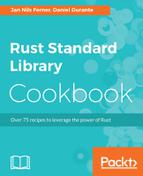Calling env::args() returns an iterator over the provided parameters[6]. By convention, the first command-line parameter on most operating systems is the path to the executable itself [12].
We can access specific parameters in two ways: keep them as an iterator [11] or collect them into a collection such as Vec[23]. Don't worry, we are going to talk about them in detail in Chapter 2, Working with Collections. For now, it's enough for you to know that:
-
Accessing an iterator forces you to check at compile time whether the element exists, for example, an if let binding [12]
-
Accessing a vector checks the validity at runtime
This means that we could have executed lines [26] and [29] without checking for their validity first in [25] and [28]. Try it yourself, add the &args[3]; line at the end of the program and run it.
